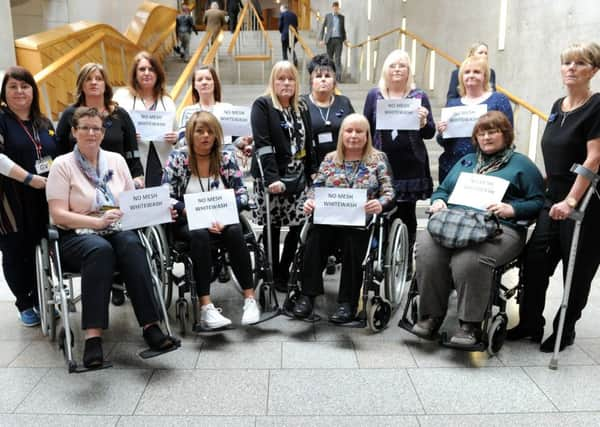Nicola Sturgeon issues apology to mesh implant survivors


The First Minister spoke out amid growing anger among survivors over an independent review into the controversial procedures in Scotland which has been branded a “whitewash”.
MSPs heard yesterday how the daughter of a mesh survivor had written to health secretary Shona Robison setting out how her mother had suffered since undergoing the surgery. It is used to treat pelvic organ prolapse and urinary incontinence among women, but has left women across the world with devastating side-effects.
Advertisement
Hide AdAdvertisement
Hide AdLabour leader Kezia Dugdale read out an e-mail to MSPs from the daughter of a mesh survivor detailing the impact on her mother and other women in Scotland. Ms Dugdale called on Ms Sturgeon to “ban this devastating and dangerous practice once and for all”.
The First Minister said: “Of course, I am deeply sorry for the suffering of these women ... who have suffered complications because of treatment with mesh.”
Ms Sturgeon said the independent review contained “eight important conclusions that health boards across the country will now be expected to take forward”.
Ms Robison said yesterday that safeguards must be in place before health boards can begin to reintroduce routine mesh implant surgery, in line with the recommendations by the independent review to ensure the “quality and safety” of the procedures.
Mesh survivors Olive McIlroy and Elaine Holmes resigned from the review panel, claiming the final report had been “diluted”, and a clinician member also withdrew.
In a statement to MSPs, Ms Robison said she recognised the process had been “very difficult and challenging”, and the government would formally examine how future reviews are carried out.
The Scottish Government does not have the power to ban the procedures as that lay with UK regulatory body the Medicines and Healthcare Products Regulatory Agency. Scottish ministers have asked NHS boards to suspend the use of transvaginal mesh implants but procedures can take place for women who want to go ahead with surgery.
The review concluded procedures must not be offered routinely to women with pelvic organ prolapse, recommended patients should be offered a range of treatments and must be given the information to make ‘’informed choices’’, and said the reporting of adverse events must be mandatory.